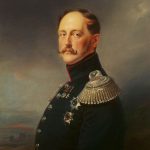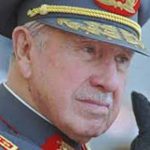The fortieth President of the United States was born in 1911. He grew up to be a college athlete and a handsome actor in Hollywood movies, westerns in particular. He was by no means a bad actor, just an underrated one. In California, where the peculiar tradition of actors becoming politicians is noted, Reagan became a Republican (conservative) Governor in 1966 when he was fifty-five years old.
He stayed in the Governor’s seat until 1974, and then in 1980 he won (not singlehandedly), a landslide victory in the presidential election. He (and his expert team) won it with a programme of reduced taxation (super-popular with the people) and greatly increased expenditure on defence against the threat of world communism. He coined the expression ‘The Evil Empire’ referring to the Soviets. There was always a lot of Hollywood in Reagan, and he had not let the success of the Lucas Starwars trilogy (as it it then was) go unnoticed.
While in the Presidency, Reagan cut federal social and welfare programmes – cuts much needed – and permitted heavy borrowing by the government. When he learned that Soviet Russia had a chain of spy activities operating in a rather openhanded manner in South America, he campaigned against it. At one stage he actually sanctioned a US raid on the island of Grenada. Waving cutlasses on tiny islands was one thing, but Reagan also improved relations with the growing enormity of China, greatly increasing trade.
Reagan became friendly with Margaret Thatcher, his fellow Conservative, and even with the Pope. This trio is said by the historians to have combined forces one way or another to put up a strong front against the belligerent Soviets.
In 1984 he defeated Walter Mondale to enter his second term as President. He determined on a course of mightily expensive space defence programmes, again reminding us of his Hollywood background by calling the programme ‘Starwars’. This was an intricate system of defence of the US by anti-missile missiles operating in space. Its real name was the Stategic Defense Initiative. Reagan was obstinate (and obtuse) about this baby of his, and tried to block any advance on nuclear arms control in 1986. Then the so-called Irangate scandal broke into the headlines, unfavourable to Reagan. It appeared that despite the anti-terrorist talk, his administration was in reality talking in secret with Iran (ex-Persia) about colossal arms deals. This was normal enough for any government, but sections of the world press revealed that profits from arms dealing would be channelled off to finance anti-Communist dissidents in places like Nicaragua.
There was a serious balance-of-payments crisis in 1987 (which eventually precipitated the world-wide recession of 1989-1991). Congress in Washington forced Reagan to reduce proposed defence expenditure in order to present a more balanced budget. Talks on nuclear arms control that had begun in Geneva in 1985 continued in Reykjavic in 1986, and then Washington D.C in 1987. These ended with a treaty with the Soviet Union called the Intermediate Nuclear Forces Treaty, which has been of incalculable importance, because it terminated all ground-based intermediate-range nuclear missiles. The Presidency of Reagan failed, however, at its end because of a quickly rising annual Federal budget deficit.
Struck with Parkinson’s, but accompanied by his indefatigable wife Nancy (also an ex-Hollywood actor), Reagan came to London when his affairs of state had ended, and famously appeared at Buckingham Palace to take coffee with the Queen, who was apparently a bit of a fan. Notwithstanding, Reagan got a frosty stare from Her Majesty when he escaped from Nancy for a second and demanded ‘decaffeinated coffee, only decaffeinated!’ The Queen said she would see what she could do. Ronald Reagan died on 5 June, 2004.











Leave A Comment